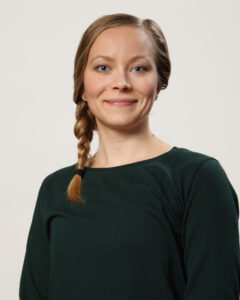8.3.2024
Doctoral thesis on the impact of the round goby on Baltic Sea coastal communities
M.Sc. Heidi Herlevi’s doctoral thesis in environmental and marine biology will be put forth for public defence at the Faculty of Science and Engineering.

The thesis is entitled Implications of the Integrations of a Non-Native Fish into Coastal Communities.
The public defence of the doctoral thesis takes place on 14 March 2024 at 1.15 PM in Stora Auditoriet, ASA-house, Vänrikinkatu 3, Turku. You can also follow the defence online. Dr. Ulf Bergström, Swedish University of Agricultural Sciences, Uppsala. Sweden will serve as opponent and Professor Christian Pansch-Hattich, Åbo Akademi University, as custos.
Summary:
The doctoral thesis sheds light on the impact of the round goby, a widely established non-native fish, on Baltic Sea coastal communities. The round goby has caused particular concern due to its rapid spread, high reproductive rates, and potential impacts on native species through predation and competition.
The research from three populations in Finland, Sweden, and Poland revealed insights into the round goby’s role in the food web as predator, competitor, and prey, as well as its effects on local fish community structure and functioning.
The results showed that the round goby’s impact on local communities varies with ecosystem properties and especially round goby population abundances. While serving as a seasonally dominating prey for important native predators like cod, pike, and perch, its local dominance in fish communities can lead to reduced native fish species richness. However, the variation in population abundances were large, and the species contributed to increased overall taxonomic and functional diversity, especially during periods of lower goby abundances.
The studies highlighted the adaptability of the round goby and emphasized the importance of considering local environmental conditions in assessing invasion impacts. These insights contribute to a better understanding of the dynamics of round goby introduction, establishment, and impacts across the Baltic Sea.
Future efforts should be directed at maintaining healthy predator populations and local diversity that may help mitigate the negative effects of species invasions. Simultaneously, preventing further spread into new areas is important. However, we as humans also have to adapt and learn to see the possibilities with this new species that is here to stay.
Heidi Herlevi was born in 1990, in Porvoo. She can be reached by email at heidi.herlevi@abo.fi.
The doctoral thesis can be read online through the Doria publication archive.
Click here for a press photo of the doctoral student.
Instructions for following the doctoral defence remotely:
To follow the defence, you need the Zoom software or the Google Chrome browser. You do not need to create a Zoom account to follow the defence. If you install the application, you participate by clicking on the meeting link, after which you should allow the link to open in the Zoom app.
